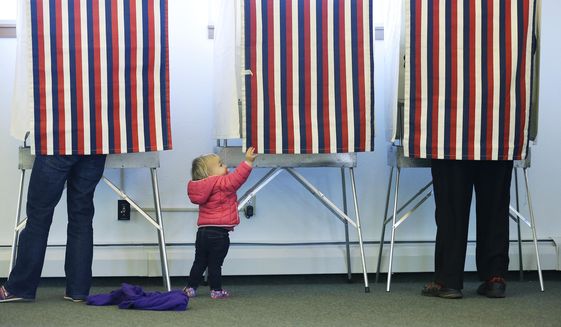No Election Day for Dummies
By Wesley Pruden
WashingtonTimes.com

Zoe Buck, a 14-month-old
child, checks out an empty voting booth as at her
mother, Julie Buck, votes at left, Tuesday Nov. 4,
2014, at the Alaska Zoo polling place in Anchorage,
Alaska. (AP Photo/Ted S. Warren)
When President Obama was elected president in 2008 on a promise to “transform” America, most voters didn’t have a clue to what he meant, and he has transformed as much as he could get by with. He’s harder at work than ever. One of his baddest bad ideas is mandatory voting.
Armed with naive goodness and foolish fancy, some others love the idea of sending cops and nannies to wake up everyone on Election Day to get them up and out to the polls, even if there’s no time to brush their teeth and put on the coffee pot.
“It would be transformative if everybody voted,” the president told a town hall in Ohio not long ago. “The people who tend not to vote are young, they’re lower income, they’re skewed toward immigrant groups and minority groups. There’s a reason why some folks try to keep them from the polls.” (Hint: It’s a racist plot.)
Sugar plums dance in Mr. Obama’s head at the mere mention of forced voting, and those plums look a lot like illegal aliens. If he can ease immigration restrictions — if he can eliminate control of the border — he can leave a more lasting legacy than merely turning the Middle East over the Iran and the mullahs and their dreams of a new holocaust. The Democrats might never lose another election.
Twenty-six countries have mandatory voting now, and punishment for doing your own thing ranges from fines (in Australia) to prison for failure to pay the fines (in Belgium).
The good-government nannies couch their scheme for forced voting in the softer language of merely encouraging the ignorant, the lazy and the uninterested to turn out to do what they should do. A Pew survey estimates that only 37 percent of the eligible voters in America actually voted last November. Almost no one considers the possibility — indeed, the probability — that the 63 percent might have made a positive contribution to good government.
Bradley Gitz, a history professor at Lyon College, a small and highly regarded Presbyterian school in Batesville, Arkansas, has collected the results of several surveys of what people know, think they know and don’t know, and the knowledge of what they would take with them to the ballot box.
Only 42 percent can identify the three branches of government, but 75 percent can identify the Three Stooges (Curly, Moe and Larry).
Only 27 percent can identify the two U.S. senators from their states, but 57 percent know that Harry Potter is the boy wizard in the J.K. Rowling books. Only 25 percent can name at least two members of the U.S. Supreme Court, but 75 percent can name two of Snow White’s dwarfs. A Gallup Poll in 1999 found that 29 percent of Americans couldn’t name the country America fought a revolution against to guarantee independence. Some of those polled thought it could have been China; others thought maybe it was Mexico or Japan. Only 29 percent in one contemporary poll could identify Joe Biden as the vice president.
“My own favorite anecdote,” says Mr. Gitz, “is from [the time] when I was teaching at a college in the East. Our next-door neighbors and their party guests got into a heated, alcohol-fueled backyard debate on the Fourth of July over what, exactly, they were celebrating. They eventually narrowed it down to the day the Japanese bombed Pearl Harbor, or the day the Germans bombed Pearl Harbor.”
Americans aren’t dumb, though the results of some of our elections might give outsiders a distorted view of who Americans are. Winston Churchill, whose mother was an American, warned against this misconception.
“Silly people — and there are many, not only in enemy countries — might discount the force of the United States,” he wrote in his memoirs. “Some said they were soft, others that they would never be united. They would fool around at a distance. They would never come to grips. They would never stand the blood-letting. Their democracy and system of recurrent elections would paralyze their war effort. They would be just a vague blur on the horizon to friend or foe. Now we should see the weakness of this numerous but remote, wealthy, and talkative people.
“But I had studied the American Civil War, fought out to the last desperate inch. American blood flowed in my veins. I thought of a remark … made to me more than 30 years [ago] — that the United States is like a gigantic boiler. Once the fire is ignited under it there is no limit to the power it can generate.”
Reassuring words, but a lot of us should turn off the idiot box and pick up something real to read. We might learn something.
• Wesley Pruden is editor emeritus of The
Washington Times.

